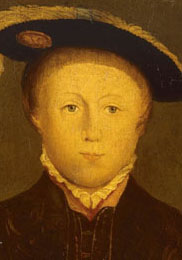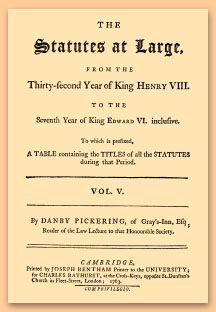|
 Based on a painting by Hans Holbein
Based on a painting by Hans Holbein
|
|
|
Statutes of King Edward VI of England
The Statutes of Edward VI have been occasionally cited by anti-masons as an example of the suppression of Freemasonry. If they do their research they will even quote the Rev. A.F.A. Woodford who wrote in Ars Quatuor Coronatorum vol. I, "We must bear in mind also that all the English Craft Guilds, except certain municipal companies, were dissolved in the first year of Edward VI ., and their property confiscated...." [p. 40.] The text of the statutes, shown below, do not substantiate this claim.
|

Titlepage.
|
Anno primo EDWARDI VI.
Statutes made in the parliament begun at Westminster the fourth day of November in the first year of the reign of our most dread sovereign lord Edward the Sixth, by the grace of God King of England, France and Ireland, defender of the faith, and of the church of England, and also of Ireland, in earth the supreme head : And from thence continued to the twenty-fourth day of December then next ensuing ; that is to say, in the first session of the same parliament, as followeth. |
| [p. 241.]
|
|
|
Anno secundo & tertio Edw. VI. c. 15 [1548.
CAP. XV.
The bill of conspiracies of victuallers and craftsmen.
|
|
IV. And it is ordained and enacted by the authority aforesaid, That no person or persons shall at any time after the first day of April next coming, interrupt, deny, let or disturb any free-mason, rough-mason, carpenter, bricklayer, plaisterer, joiner, hardhewer, sawyer, tiler, paver, glasier, lime-burner, brick-maker, tile-maker, plummer or labourer, born in this realm or made denizen, to work in any of the said crafts in any city, borough or town corporate, with any person and persons that will retain him or them, albeit the said person or persons so retained or any of them do not inhabit or dwell in the city, borough or town corporate where he or they shall work, nor be free of the same city, borough or town ; any statute, law, ordinance or other thing whatsoever had or made to the contrary in any wise notwithstanding; (2) and that upon pain of forfeiture of five pounds for every interruption or disturbance done contrary to this statute ; the one moiety of every such forfeiture to be to the King, and the other moiety thereof to be to him or them that will sue for the same in any of the King’s courts of record, by bill, plaint, action of debt or information, wherein no wager of law, essoin nor protection shall be allowed. Continued by 22 & 23 Car. 2. c. 19. except as such things as are thereby altered or repealed. [p. 313]
|
|
Anno tertio & quarto Edw. VI. c. 20 [1549.
CAP. XX.
An act touching the repeal of a certain branch of an act passed in the last session of this parliament concerning victuallers and artificers.
|
|
W
HERE by a certain act in the parliament holden at Westminster by prorogation the fourth day of November in the second year of the reign of our most dread sovereign lord the King that now is, it is enacted and established, That no person or persons should at any time after the first day of April then next ensuing, interrupt, deny, let or disturb any free mason, rough mason, carpenter, bricklayer, plaisterer, joiner, hard-hewer, sawyer, tiler, pavier, glasier, lime-burner, brick-maker, tile-maker, plumber or labourer, born in this realm, or made denizen, to work in any of the said crafts in any city, borough or town corporate, with any person and persons that will retain him or them, albeit the said person or persons so retained, or any of them, do not inhabit or dwell in the city, borough or town corporate where he or they shall work, nor be free of the same city, borough or town; any statute, law, ordinance or other thing whatsoever, before had or made to the contrary in any wise notwithstanding; (2) and that upon pain of forfeiture of v. li. for every interruption or disturbance done contrary to the said estatute; the one moiety of every such forfeiture to be to the King, and the other moiety thereof to be to him or them that will sue for the same in any of the King’s courts of record, by bill, plaint, action of debt or information, wherein no wager of law, essoin nor protection should be allowed, as by the said act of parliament amongst other things more plainly appeareth.
II. And forasmuch as in the city of London being the King’s chamber, and most ancient city of this realm, the artificers and craftsmen of the arts, crafts and mysteries aforesaid, are at great costs and charges, as well in bearing and paying of taxes, tallages, subsidies, scot, lot and other charges, as well as to the King’s majesty, as to the said city, and at many and sundry triumphs, and other times for the King’s honour, and that if foreigners should come and work among them, within the liberties of the said city, contrary to their ancient privileges, that the same should be a great decay of cunning, and an impoverishment and driving away of the free-men, being artificers of the crafts, arts and mysteries aforesaid, within the said city of London, to the great hurt or destruction of the said city :
III. For reformation whereof the King’s majesty is pleased and contented that it be enacted by the authority of this present parliament, with the assent of the lords spiritual and temporal, and of the commons, in this present parliament assembled, That the said act, only touching the article and clause aforesaid, and all and every sentence and branch contained in the said act concerning the same article, shall from henceforth be resumed, repealed, adnulled, revoked, adnihilated and utterly made void for ever; any thing contained in the said former act touching the clause or article aforesaid in any wise to the contrary notwithstanding. [p. 347]
Excerpts faithfully transcribed from THE Statutes at Large, FROM THE Thirty-second Year of King HENRY VIII. TO THE Seventh Year of King Edward VI. inclusive. To which is prefixed, A TABLE containing the TITLES of all the STATUTES during that Period., VOL. V., By DANBY PICKERING, of Gray’s-Inn, Esq; Reader of the Law Lecture to that Honourable Society. CAMBRIDGE, Printed by JOSEPH BENTHAM Printer to the UNIVERSITY; for CHARLES BATHURST, at the Cross-Keys, opposite St. Dunstan’s Church in Fleet-Street, London; 1763. CUM PRIVILEGIO.
from a copy in the Law Library of the British Columbia Court House, Vancouver. Note that the long "s" has been converted to conventional usage. Page numbers noted in brackets.
|
|